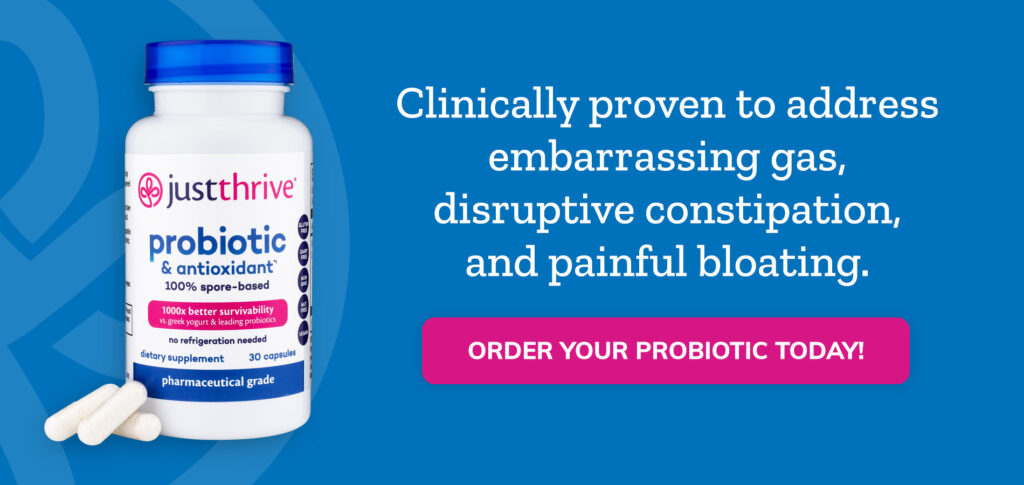Table of Contents[Hide][Show]
It’s an all-too-common issue… One that can make some people feel uncomfortable (in more ways than one!)
First – let’s be clear: Constipation isn’t the same as having an occasional backup, or missing a day of #2 here and there. The inability to go will impact almost everyone at some point in their life, but when it goes from intermittent to ongoing, the occasional inconvenience turns into something much more.
Having a bowel movement three times a day or three times a week? That’s considered “normal.” Persistent constipation is much different. Regular poops become hard and lumpy, and the stool is very difficult to pass. This stool can remain in the bowel for weeks and sometimes months. The accumulation within the colon frequently produces excruciating pelvic and abdominal pressure and discomfort, making every activity difficult.
You can’t just ignore this type of constipation and hope that it goes away. And while drinking some prune juice or taking a laxative may help in the short term, for total relief, you need a different strategy.
You see, not only is ongoing, chronic constipation terrifically unpleasant, it can leave you feeling absolutely drained (physically and emotionally). Your insides are just plain unhappy… The painful distention around your waist can at times seem impossible to bear… And for many, it’s not unusual for the intestinal pain to make EVERYTHING feel hard, including going to work or attending school.
However… There is most certainly something you can do to support your bowels and get rid of even the toughest constipation challenges. With the right approach, you can get back to life outside the bathroom, and even make it easy to “go” day in and day out.
But before we get there, let’s have a quick look at constipation data to see just how common and problematic it truly is…
Constipation By the Numbers
Though it’s rarely a topic of discussion around the dinner table, constipation is a lot more common than most people realize… And a lot more serious! More than 3 million Americans go to the doctor every year because of constipation. And of course, millions more suffer through the discomfort and pain and try to deal with it on their own. According to research, constipation affects up to 20% of people—the most impacted are often women (especially pregnant women) and older adults.
While there’s nothing fun about being backed up, here’s an interesting constipation fact most people don’t realize: According to studies, constipation can really take a toll on your life outside the bathroom—more specifically, it can really hurt your bank account. Every year in the U.S. people spend around $750 million trying to unclog and unblock their bowels. Unfortunately, the vast majority of over-the-counter “cures” are marginally effective at best. But that doesn’t deter desperate people from running to the store for laxatives and stool softeners that have been shown to fail at least 50% of the time (and are not recommended as a long term solution).
But it’s not just your wallet that takes a hit – There’s also a personal cost. For those enduring chronic constipation, thanks to pain, uncertainty, and fear of being away from your home bathroom, their social life can suffer as well. And in the bedroom? There’s not a lot that’s sexy about feeling constipated and bloated. For one or both partners who are enduring an ongoing backup, this can really get in the way of intimacy.
And at work? It’s estimated that every year there are over 700 million lost work days because constipation got in the way of people being able to show up for their job. Missed work time can sometimes lead to job loss. And all of this can lead to mood issues, anxiety and even depression.
Constipation Is More Than Being Backed Up
The longer you go between bowel movements, the harder it gets to poop. And while technically constipation means going fewer than 3 times per week, everyone is different. So while you might go more or less than that, you know you’re constipated if you’re dealing with:
- Dry, hard, lumpy poop
- Bowel movements that are painful
- Poop that’s doesn’t want to come out
- Feeling like your bowels are never empty
- Abdominal bloating, cramps or pain
- Lethargy
- Decreased appetite
But what causes these troublesome symptoms?
When you digest food, it moves through your digestive system. Your body pulls out the nutrients and other compounds like antioxidants, and sends the rest through as waste. Solid feces is formed when that waste goes to your intestines (your gut) where water is absorbed, thereby forming solid stool. This is what your body eventually pushed out.
However, if your intestines absorb too much water, your stool gets dried out. This is what creates the hard in consistency, making it more difficult for your body to excrete.
So, if you’re going to effectively address constipation, you must start your efforts by focusing on the health of your gut.
How an “Off Balance” Gut Causes Constipation
It may surprise you to know that humans and bacteria have lived symbiotically since the dawn of time. There are over 100 trillion bacteria that travel throughout your body, and make up the majority of cells in your body. The gut, which contains around 70% of all human-associated bacteria is thought to contain at least 1,000 different species. Collectively, these different species of bacterial colonies are known as your “gut microbiome.”
In a healthy gut and balanced gut, most of the bacteria will be beneficial bacteria (aka: probiotics) with only a small population of bad bacteria (aka: pathogens). Surprising as it may sound, these probiotic bacteria play a big role in every critical function in your body, including maintaining and driving your digestive health – and that includes regulating the poop process.
However, in an unbalanced gut microbiome, pathogens will outnumber and crowd out the probiotics. The technical term for this lack of good gut bugs is “dysbiosis,” and it’s a condition that causes all sorts of health problems, in your gut and throughout your body.
Research shows that the gut microbiomes of people with chronic constipation look vastly different than those of healthy people. Unhealthy guts contain significantly higher levels of pathogens. This is problematic for a number of reasons, none the least of which is because your body needs probiotic bacteria to produce important, bowl-supporting compounds called short chain fatty acids (SCFAs). Your body, and especially your intestines, needs SCFAs to regulate the amount of water removed from stool. So low levels of SCFA are a sure path to occasional and chronic constipation.
Dysbiosis can also negatively affect motility (the way your body moves food through your intestines) and transit time (how long it takes for your body to move through the intestines). Both of these processes play key roles in constipation, so if they’re disrupted, it’s bad news for your bowels.
But there is good news: Correcting the bacterial imbalances in your gut microbiome can help stop constipation in its tracks.
How To Correct Dysbiosis And Relieve Constipation
Rebalancing your gut microbiome to have more probiotics and less pathogens is a crucial step for conquering constipation. A healthy gut that contains large populations of beneficial, SCFA-producing bacteria can help make bowel movements smooth, easy, and regular.
And one of the best and most proven ways to keep your gut microbiome balanced in favor of the good guys is by adding more probiotics to your gut via diet and supplementation.
Probiotic Foods
Foods rich in probiotic bacteria can have a profoundly beneficial effect on the gut. They help keep your gut healthy, which, in turn, can boost your immune system, balance your emotional wellbeing, and of course, help prevent bowel-challenges like constipation.
Your local grocery store should have a decent selection of foods naturally rich in probiotics. You can find fermented foods in the refrigerated section (as with sauerkraut) and in the dairy aisle (as with yogurt).
Here’s a short list of fantastic, gut healthy foods to grab:
- Miso
- Pickles
- Sauerkraut
- Yogurt (Greek, plain)
- Kombucha tea drink
- Kimchi
- Tempeh
- Kefir
- Apple cider vinegar
Probiotic Supplements
Probiotic foods can be a wonderful addition to just about any eating regimen. However, many people find that they’re not able to get everything they need to for constipation support from probiotic foods alone. If constipation is a regular problem for you, consider trying a high quality probiotic supplement.
However, when choosing to supplement, one word of caution: Not all probiotic products are created equal. Like all nutritional supplements, probiotic brands can vary greatly in effectiveness.
In fact, survivability studies from some of the leading probiotic supplements indicate that 99% of the strains available cannot survive digestion. And if a probiotic can’t survive past your stomach to reach your intestines alive, it can’t provide maximum benefit.
Survivability is just one of several reasons why your best bet for constipation relief is to use a brand made with only the highest quality, clinically proven spore-based probiotic strains.
Spore-based probiotics are created using microorganisms commonly found in soil and vegetation. This specific type of beneficial bacteria has a much higher survivability rate due to its natural endospore shell that protects the bacteria when the environment gets harsh. This shell is so impervious to danger, that some specific types of spore strains even boast a 100% survivability rating!
And when your probiotic supplement can reach your gut intact, you’ll notice a difference – Especially when it comes to constipation. In fact, studies show that taking spore probiotics can offer incredible relief:
- A recent clinical trial found that spore probiotics helped create ideal stool consistency and softened hard stools
- A 2021 clinical trial found that a particular type of spore probiotic – Bacillus coagulans – significantly helped intestinal transit time, relieved bowel discomfort, and increased production of SCFAs in adults with constipation
- An analysis of 18 studies proved that probiotics can be useful for healing constipation, even after other treatments haven’t worked
Keep Things Moving Smoothly
Constipation is a common problem for many people, and it can be a painful, even life disrupting challenge. Luckily, there are things you can do to support your bowels and get rid of even the toughest constipation problems.
If constipation has become an everyday issue, start on your path to feeling better by improving the health of your microbiome. Try adding probiotic foods and supplements to your daily regimen, and of course, talk with your doctor to ensure any new plan is right for you.
You May Also Like…




